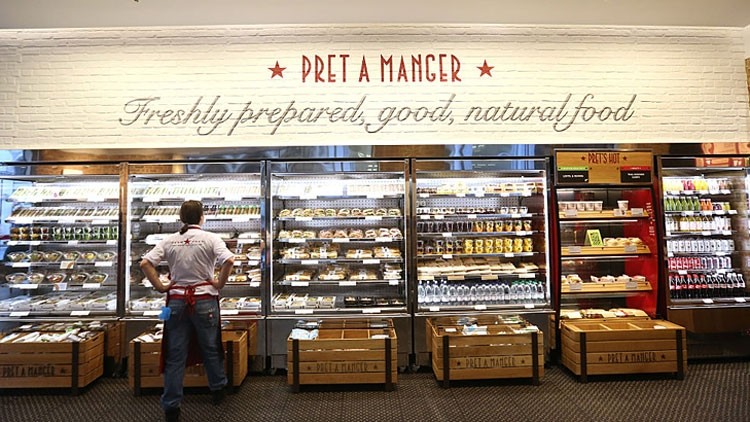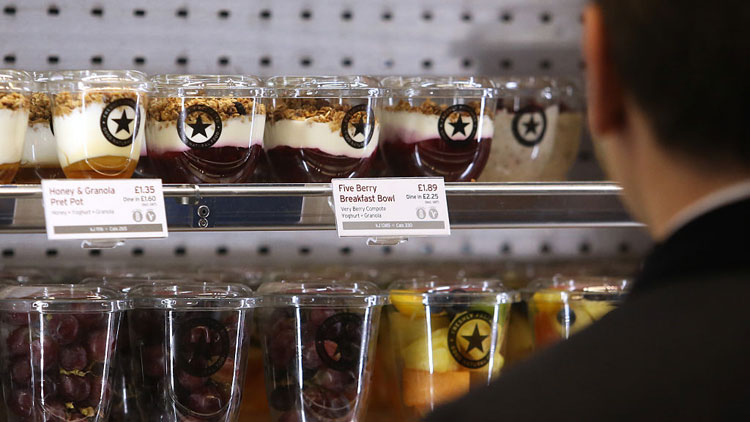What’s next for Pret a Manger?

When Pret a Manger’s £1.5bn sale to European investment group JAB Holding was announced last year, the café chain’s CEO Clive Schlee hailed it as a “day of celebration”. “I am really looking forward to this next chapter of Pret’s story,” he said.
But just 14 months later Schlee has announced he is to step down in September after 16 years at the helm. It may seem a natural point of retirement after so long at one employer, but his departure also comes at a turning point for the company.
On paper Schlee’s record is impressive. Since he took the top job in 2003, Pret’s sales have grown tenfold and it now has more than 550 sites in nine markets worldwide. When the first Pret opened in Westminster in 1986 it sold just 12 coffees a day. Today the chain says it sells 1.4m, and the company announced its ninth consecutive year of like-for-like sales growth in 2017.
But though the accounts may seem as positive as Pret’s cheery PR face, it’s been an undoubtedly difficult year for the business. So what challenges does incoming CEO Pano Christou face?
Allergen awareness
The deaths of 15-year-old Natasha Ednan-Laperouse and 42-year-old Celia Marsh, who suffered allergic reactions after eating Pret sandwiches in 2016 and 2017 respectively, have cast a shadow over the end of Schlee’s tenure. In an interview with ITV News he described listening to testimony of Ednan-Laperouse’s final moments as “the worst period of my life”.
Schlee promised the tragedy would result in “meaningful change”, and Pret has now become the first major food retailer to take serious action on the issue. A five-point plan was launched in May, with changes that have included altering recipes to remove allergens, listing the full ingredients of every item on packaging and additional training for staff. Pret is continuing to work with an independent Food Advisory Panel on the policy, so Christou may have to further adjust to its operations to ensure the plan works in practice.
Food focus
There have been changes too across Pret’s wider food offer. In April the company unveiled ‘the biggest menu shake-up in its 33-year history’ with the introduction of 20 new items, including eight vegan options and its own recipe of gluten-free bread.
The challenge for Christou will be to maintain this focus on product and quality as Pret looks to grow. Though it may seem like a ubiquitous brand in parts of the UK, in reality Pret has around 400 UK stores. While this is no small number, it is still dwarfed by Starbucks (c.1,000 UK sites), McDonald’s (1,300), Costa (over 2,400) and Greggs (1,950).
One of Pret’s strengths is that, like Greggs, it is positioned as a food retailer that also sells coffee, rather than the reverse. This approach, and some savvy marketing, has paid off (there are not many chains where the launch of a new sandwich, as with its lobster roll, generates national press coverage). It’s also put Pret ahead of the curve with increasingly health-conscious consumers while high street rival Starbucks, arguably with a weaker food offer, recently posted pre-tax losses of up to £17.2m in the UK.
Further expansion is now on the cards following Pret’s takeover of rival café chain Eat this week, with plans to convert most of its 94 sites to the Veggie Pret concept.
It’s hard to believe it’s only been three years since the tentative launch of Pret’s first pop-up vegetarian-only store. But while the concept has been embraced by consumers, a meat-free menu feels less revolutionary than it did in 2016. The rise of plant-based dining is now driving menu changes everywhere from KFC to McDonald’s, and in the face of competition from ‘healthy fast food’ brands such as Leon, Pret will need to ensure its menu stays fresh in an evolving market.
People power
Growth is not possible without staff, and Pret has previously admitted to struggling to recruit British workers at home. In 2017, its HR director told a House of Lords Select Committee the company was reliant on EU migrant workers and that just one in 50 people who applied for a job in its cafes was British.
The company has sought to address this with the launch of an apprenticeship programme, and it also runs paid work experience schemes for 16-18-year-olds across the country. But with the looming Brexit deadline, and possible restrictions on EU migration, recruitment may present further issues for the chain going forward.
Pret's incoming CEO is a prime example of the opportunity available within the industry. Christou started as assistant manager at the group's Carnaby Street site 19 years ago and worked his way up to become managing director in 2014 and chief operating office at the start of this year. “Pret has big plans for the next few years…we look forward to building on [Schlee’s] legacy,” says Christou.
Pret may be primed for growth, but its new boss will need to ensure the company keeps evolving or risk its success turning stale.





















